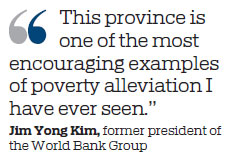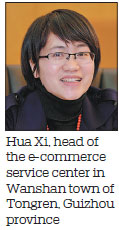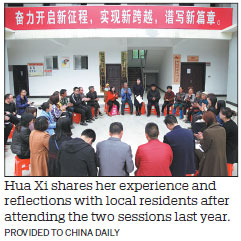
Taking a locally produced vermilion bracelet to Beijing, Hua Xi, a 31-year-old from Guizhou province, is eager to show the rapid development of local goods through e-commerce during the two sessions - the annual gathering of the nation's top legislature and its top body of political advisers - being held in March.
Known as a rural online vendor, Hua is a deputy to the 13th National People's Congress. After her graduation in 2008, she spent several years working in the e-commerce industry in Zhejiang province.
In 2014, she returned to Wanshan town in Tongren city, her hometown, as a civil servant. A year later, Alibaba introduced its e-commerce project to the rural areas of Tongren. Hua resigned from the government office and started her e-commerce business.
Using her experience, Hua set up an e-commerce service center in Wanshan town in 2015. Her online shops can sell around 3,000 items a day, she said.
"I have been to many rural areas since I started the e-commerce business and have met with many farmers after I came back to Guizhou," she said.

To promote the local e-commerce industry, Hua has set up an e-commerce school to help adults launch startups.
With her help, Wu Xiongyun began Taobao trading in 2017 to sell household appliances and agricultural products. He also helps local farmers purchase tools such as mini-tillers and tricycles.
"I can earn more than 3,000 yuan ($448) per month and have time to take care of my family. I have been on the right track," he said.
Villagers now have the convenience to buy merchandise through online shops, which can improve their quality of life, Hua said.
"E-commerce is a good method to expand markets for Guizhou's local specialties," she added.

In 2015, Hua founded her company to sell native products in Guizhou, including tea tree oil, rice wine and tea leaves. Last year, she cooperated with a local big data company to develop an app to sell Guizhou's products. It attracted more than 100,000 people to register in a few months.
"Turning local specialties into online merchandise will bring many changes to farmers' production and life," Hua said.
In recent years, the Guizhou provincial government has regarded the e-commerce business in rural areas as a key project to alleviate poverty. At present, the province has promoted national-level and provincial-level rural comprehensive pilot programs about e-commerce in 79 regions.
Official data shows that from January to September 2018, the total retail sales of e-commerce in the province reached over 11.13 billion yuan, an increase of 34.88 percent year-on-year.
In recent years, Guizhou has made great progress in helping people get rid of poverty, said Jim Yong Kim, former president of the World Bank Group.
"This province is one of the most encouraging examples of poverty alleviation I have ever seen."
By 2020, Guizhou is expected to achieve 360 billion yuan in e-commerce transactions, open 1,000 online shops for agricultural merchandise and set up 10,000 village-level e-commerce service stations, according to the province's department of commerce.
Zhao Yandi contributed to this story.
liangkaiyan@chinadaily.com.cn

(China Daily 03/05/2019 page15)